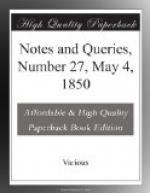Your lines the wond’rous change
impart,
From whence our laurels spring;
In numbers fram’d to please the
heart,
And merit what they sing.
Methinks thy poet’s gentle shade
Its wreath presents to thee;
What Daphne owes you as a Maid,
She pays you as a Tree.
The charming poem by the same author, beginning—
“My days have been so wond’rous free,”
has the additional fourth stanza,—
“An eager hope within my breast,
Does ev’ry doubt controul,
And charming Nancy stands confest
The fav’rite of my soul.”
Can any of your readers supply the name of the “young lady” who translated the story of Phoebus and Daphne?
C.P.
* * * * *
EARLY ENGLISH AND EARLY GERMAN LITERATURE.—“NEWS” AND “NOISE.”
I am anxious to put a question as to the communication that may have taken place between the English and German tongues previous to the sixteenth century. Possibly the materials for answering it may not exist; but it appears to me that it is of great importance, in an etymological point of view, that the extent of such communication, and the influence it has had upon our language, should be ascertained. In turning over the leaves of the Shakspeare Society’s Papers, vol. i., some time ago, my attention was attracted by a “Song in praise of his Mistress,” by John Heywood, the dramatist. I was immediately struck by the great resemblance it presented to another poem on the same subject by a German writer, whose real or assumed name, I do not know which, was “Muscanbluet,” and which poem is to be found in Der Clara Haetzlerin Liederbuch, a collection made by a nun of Augsburg in 1471. The following are passages for comparison:—
“Fyrst was her skyn,
Whith, smoth, and thyn,
And every vayne
So blewe sene playne;
Her golden heare
To see her weare,
Her werying gere,
Alas! I fere
To tell all to you
I shall undo you.
“Her eye so rollyng,
Ech harte conterollyng;
Her nose not long,
Nor stode not wrong;
Her finger typs
So clene she clyps;
Her rosy lyps,
Her chekes gossyps,”
&c. &c.
S.S. Papers, vol. i. p. 72
“Ir muendlin rott
Uss senender nott
Mir helffen kan,
Das mir kain man
Mit nichten kan puessen.
O liechte kel,
Wie vein, wie gel
Ist dir dein har,
Dein aeuglin clar,
Zartt fraw, lass mich an sehen.
Und tu mir kund
Uss rottem mund, &c.
Dein aermlin weisz Mit gantzem fleisz Geschnitzet sein, Die hennde dein Gar hofelich gezieret, Dem leib ist ran, Gar wolgetan Sind dir dein prust,” &c. &c.
Clara Haetzlerin Liederbuch, p. 111.




